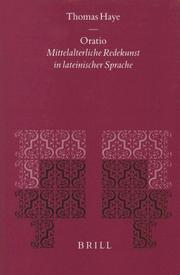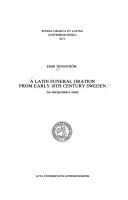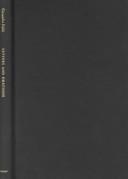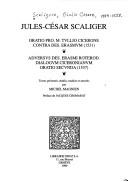| Listing 1 - 10 of 15 | << page >> |
Sort by
|
Book
ISBN: 3322002675 9783322002679 Year: 1986 Volume: vol *259 Publisher: Leipzig BSB B.G. Teubner Verlagsgesellschaft
Abstract | Keywords | Export | Availability | Bookmark
 Loading...
Loading...Choose an application
- Reference Manager
- EndNote
- RefWorks (Direct export to RefWorks)

ISBN: 9004113355 9004452672 Year: 1999 Volume: 27 Publisher: Leiden Brill
Abstract | Keywords | Export | Availability | Bookmark
 Loading...
Loading...Choose an application
- Reference Manager
- EndNote
- RefWorks (Direct export to RefWorks)
Medieval Latin language --- Literary rhetorics --- Speeches, addresses, etc., Latin (Medieval and modern) --- History and criticism. --- Latin orations, Medieval and modern --- Latin speeches, Medieval and modern --- History and criticism --- Speaches, addresses, etc. [Latin ] (Medieval and modern)
Book
ISBN: 1280496312 9786613591548 9004228624 9789004228627 9004223649 9789004223646 9781280496318 6613591548 Year: 2012 Publisher: Leiden BRILL
Abstract | Keywords | Export | Availability | Bookmark
 Loading...
Loading...Choose an application
- Reference Manager
- EndNote
- RefWorks (Direct export to RefWorks)
This is a critical, annotated, bilingual edition, with introduction and cumulative indices, of the last three of Vives' five speeches on the abdication of Sulla, the Roman Republican dictator. These five declamations form an unprecedented dramatic ensemble, grounded in thorough familiarity with the ancient sources, but amplified occasionally by elements of historical fiction. The third oration is Sulla's formal abdication, defending his sometimes savage record. In the fourth, Sulla's enemy Lepidus the new consul promises to undo Sulla's program; in the fifth, at Sulla's death, Lepidus continues his unrestrained attack on Sulla's morals, henchmen, and constitutional alterations. The five-speech ensemble, dedicated to the Emperor Charles V's youthful brother Ferdinand, explores political and ethical issues while exemplifying Vives' remarkable generic versatility.
Speeches, addresses, etc., Latin (Medieval and modern) --- Statesmen --- Latin orations, Medieval and modern --- Latin speeches, Medieval and modern --- Sulla, Lucius Cornelius. --- Sylla, Lucius Cornelius --- Sulla Felix, Lucius Cornelius --- Silla, Lucius Cornelius --- Scilla, Lucius Cornelius --- Silla, Lucio --- Syllas, Leukios Kornēlios --- Rome --- History
Book
ISSN: 02331160 ISBN: 3110948877 9783110948875 3322002675 9783598719219 3598719213 Year: 1986 Publisher: Leipzig B.G. Tuebner
Abstract | Keywords | Export | Availability | Bookmark
 Loading...
Loading...Choose an application
- Reference Manager
- EndNote
- RefWorks (Direct export to RefWorks)
Orationes IV, Cum Apologia Et CB.
Speeches, addresses, etc., Latin (Medieval and modern) -- Translations into French. --- Speeches, addresses, etc., Latin (Medieval and modern). --- Speeches, addresses, etc., Latin. --- Languages & Literatures --- Greek & Latin Languages & Literatures --- Latin orations --- Latin speeches --- Latin orations, Medieval and modern --- Latin speeches, Medieval and modern --- Speeches, addresses, etc., Latin (Medieval and modern)

ISBN: 9173461202 9789173461207 Year: 1983 Volume: 45 Publisher: Gothenburg: Universitas,
Abstract | Keywords | Export | Availability | Bookmark
 Loading...
Loading...Choose an application
- Reference Manager
- EndNote
- RefWorks (Direct export to RefWorks)
Funeral orations --- Speeches, addresses, etc., Latin (Medieval and modern) --- Eloges funèbres --- History and criticism --- Histoire et critique --- Upmarck, Johan, --- Bellman, Johan Arendt, --- Sweden --- Suède --- Intellectual life --- Vie intellectuelle --- Speeches, addresses, etc, Latin (Medieval and modern) --- -Speeches, addresses, etc., Latin (Medieval and modern) --- -Latin orations, Medieval and modern --- Latin speeches, Medieval and modern --- Occasional speeches --- Upmarck, Johan --- Bellman, Johan Arendt --- -Funeral orations --- History and criticism. --- -History and criticism --- Eloges funèbres --- Suède --- Latin orations, Medieval and modern --- Zweden --- Schweden --- Svezia --- Suecia --- Zviedrija --- Shvet︠s︡ii︠a︡ --- Szwecja --- Sverige --- Konungariket Sverige --- Kingdom of Sweden --- スウェーデン --- Suwēden --- Upmarck (Johan). --- Oraisons funèbres latines. Suède. 18e s. --- Latijnse lijkredenen. Zweden. 18e eeuw. --- Funeral orations - History and criticism --- Speeches, addresses, etc, Latin (Medieval and modern) - Sweden - History and criticism --- Upmarck, Johan, - 1664-1743 - Laudatio funebris Johanni Arndio Bellmanno dicta --- Bellman, Johan Arendt, - 1664-1709 --- Sweden - Intellectual life - 18th century
Book
ISBN: 080781783X Year: 1989 Publisher: Chapel Hill University of North Carolina press
Abstract | Keywords | Export | Availability | Bookmark
 Loading...
Loading...Choose an application
- Reference Manager
- EndNote
- RefWorks (Direct export to RefWorks)
Didactic literature, Latin (Medieval and modern) --- Ethics in literature --- Funeral orations --- Humanists --- Oratory --- Rhetoric, Medieval --- Rhetoric --- Speeches, addresses, etc., Latin (Medieval and modern) --- Latin orations, Medieval and modern --- Latin speeches, Medieval and modern --- Argumentation --- Oratory, Primitive --- Speaking --- Language and languages --- Speeches, addresses, etc. --- Debates and debating --- Elocution --- Eloquence --- Lectures and lecturing --- Persuasion (Rhetoric) --- Public speaking --- Occasional speeches --- History and criticism --- History --- Italy --- Intellectual life --- Philosophy and psychology of culture --- Literary rhetorics --- Italian literature --- anno 1400-1499
Book
ISBN: 9780511609626 9780521737623 9781139129893 1139129899 0521737621 110719332X 1283330423 9786613330420 1139134930 1139133829 0511504365 0511506503 0511609620 Year: 2008 Publisher: Cambridge Cambridge University Press
Abstract | Keywords | Export | Availability | Bookmark
 Loading...
Loading...Choose an application
- Reference Manager
- EndNote
- RefWorks (Direct export to RefWorks)
While Orator of the University of Cambridge, Anthony Bowen delivered one hundred and twenty-five Latin speeches at the Senate House in praise of a variety of distinguished people on the occasion of their receiving Honorary Degrees. Fifty-two are presented here, with facing translations. The fifty-first Orator in an unbroken sequence going back to 1521, Mr Bowen's speeches adapt themselves admirably to the challenge of speaking even of modern phenomena in the language and cadences as far as possible derived from antiquity; although words such as transistor (gen. transistoris, m.) may occasionally need to be invented. The subjects of the speeches include Nelson Mandela, Rowan Williams, Betty Boothroyd, Cleo Laine, Kiri Te Kanawa, Anthony Gormley, and a host of others including many distinguished international scientists.
Speeches, addresses, etc., Latin (Medieval and modern) --- Latin orations, Medieval and modern --- Latin speeches, Medieval and modern --- Bowen, Anthony. --- Bowen, A. --- Bowen, A. J. --- University of Cambridge --- Degrees. --- Academia Cantabrigiensis --- Cambridge. University --- Cambridge University --- Chien-chʻiao ta hsüeh --- Jianqiao da xue --- Kambrija Yeke Surġaġuli --- Kembridzhiĭn Ikh Surguulʹ --- Universität Cambridge --- Ying-kuo Chien-chʻiao ta hsüeh --- Кембриджийн Их Сургууль --- 剑桥大学 --- Chancellor, Masters, and Scholars of the University of Cambridge

ISBN: 1281125946 9786611125943 0226590097 9780226590097 9780226590073 0226590070 9780226590080 0226590089 0226590070 0226590089 9781281125941 6611125949 Year: 2004 Publisher: Chicago University of Chicago Press
Abstract | Keywords | Export | Availability | Bookmark
 Loading...
Loading...Choose an application
- Reference Manager
- EndNote
- RefWorks (Direct export to RefWorks)
Renowned in her day for her scholarship and eloquence, Isotta Nogarola (1418-66) remained one of the most famous women of the Italian Renaissance for centuries after her death. And because she was one of the first women to carve out a place for herself in the male-dominated republic of letters, Nogarola served as a crucial role model for generations of aspiring female artists and writers. This volume presents English translations of all of Nogarola's extant works and highlights just how daring and original her convictions were. In her letters and orations, Nogarola elegantly synthesized Greco-Roman thought with biblical teachings. And striding across the stage in public, she lectured the Veronese citizenry on everything from history and religion to politics and morality. But the most influential of Nogarola's works was a performance piece, Dialogue on Adam and Eve, in which she discussed the relative sinfulness of Adam and Eve-thereby opening up a centuries-long debate in Europe on gender and the nature of woman and establishing herself as an important figure in Western intellectual history. This book will be a must read for teachers and students of Women's Studies as well as of Renaissance literature and history.
Speeches, addresses, etc., Latin (Medieval and modern) --- Women --- Authors, Latin (Medieval and modern) --- Humanists --- Human females --- Wimmin --- Woman --- Womon --- Womyn --- Females --- Human beings --- Femininity --- Latin orations, Medieval and modern --- Latin speeches, Medieval and modern --- History --- Nogarola, Isotta, --- Italy --- Verona (Italy) --- Ṿeronah (Italy) --- Intellectual life --- collected works, collection, anthology, letters, discussion, bible, biblical, speeches, speech, oratory, classics, classical, female, feminine, feminist, italy, italian, renaissance, role model, women, womens issues, translation, english, greco roman, thinker, intellectual, verona, morals, morality, sin, humanist, western, literature, literary, performance, college, university.

ISBN: 1281125547 9786611125547 0226239330 9780226239330 9780226239316 0226239314 0226239322 9780226239323 9781281125545 661112554X Year: 2000 Publisher: Chicago University of Chicago Press
Abstract | Keywords | Export | Availability | Bookmark
 Loading...
Loading...Choose an application
- Reference Manager
- EndNote
- RefWorks (Direct export to RefWorks)
By the end of the fifteenth century, Cassandra Fedele (1465-1558), a learned middle-class woman of Venice, was arguably the most famous woman writer and scholar in Europe. A cultural icon in her own time, she regularly corresponded with the king of France, lords of Milan and Naples, the Borgia pope Alexander VI, and even maintained a ten-year epistolary exchange with Queen Isabella and King Ferdinand of Spain that resulted in an invitation for her to join their court. Fedele's letters reveal the central, mediating role she occupied in a community of scholars otherwise inaccessible to women. Her unique admittance into this community is also highlighted by her presence as the first independent woman writer in Italy to speak publicly and, more importantly, the first to address philosophical, political, and moral issues in her own voice. Her three public orations and almost all of her letters, translated into English, are presented here for the first time.
Speeches, addresses, etc., Latin (Medieval and modern) --- Authors, Latin (Medieval and modern) --- Humanists --- Feminists --- Feminism --- Social reformers --- Latin authors (Medieval and modern) --- Latin orations, Medieval and modern --- Latin speeches, Medieval and modern --- Scholars --- Fedele, Cassandra, --- Fidelis, Cassandrae, --- Italy --- Intellectual life --- early modern european literature, lit criticism, 15th century, female authors, women writers, venice, italy, cultural icon, king of france, milan naples, scholarship, renaissance period, pope alexander vi, queen isabella, ferdinand, spain, world leaders, letters, correspondence, epistulary writing, pen pals, independent woman, middle class, moral issues, ethics, social commentary, public orations, politics, history, political figures.

ISBN: 2600003363 9782600003360 Year: 1999 Volume: 329 Publisher: Genève Droz
Abstract | Keywords | Export | Availability | Bookmark
 Loading...
Loading...Choose an application
- Reference Manager
- EndNote
- RefWorks (Direct export to RefWorks)
Scaliger, Julius Caesar --- Discours, allocutions latins (Médiévales et modernes) --- Humanisten --- Humanistes --- Humanists --- Redevoeringen, toespraken [Latijnse ] (Middeleeuwse en moderne) --- Speaches, addresses, etc. [Latin ] (Medieval and modern) --- Speeches, addresses, etc., Latin (Medieval and modern) --- Humanists. --- Latin orations, Medieval and modern --- Latin speeches, Medieval and modern --- Scholars --- Erasmus, Desiderius --- Erasmus, Desiderius, --- Érasme --- Desiderius Erasmus --- Erasm, Dezideriĭ --- Erasme, Désiré --- Erasmo, --- Erasmo, Desidério --- Erasmus, --- Ėrazm, --- Erazm, --- Roterodamus, Erasmus --- Rotterdamskiĭ, Ėrazm --- Rotterdamský, Erasmus Desiderius --- Роттердамский, Эразм --- Эразм, --- Ерасм, Дезидерий --- Erasmus Roterodamus, Desiderius --- Erasmus --- Translations into French --- エラスムス, デシデリウス --- Speeches, addresses, etc., Latin (Medieval and modern) - Translations into French. --- Desiderius Erasmus, --- Erasm, Dezideriĭ, --- Erasme, Désiré, --- Erasmo, Desidério, --- Roterodamus, Erasmus, --- Rotterdamskiĭ, Ėrazm, --- Rotterdamský, Erasmus Desiderius, --- Роттердамский, Эразм, --- Ерасм, Дезидерий, --- אראסמוס, דסידריוס,
| Listing 1 - 10 of 15 | << page >> |
Sort by
|

 Search
Search Feedback
Feedback About UniCat
About UniCat  Help
Help News
News